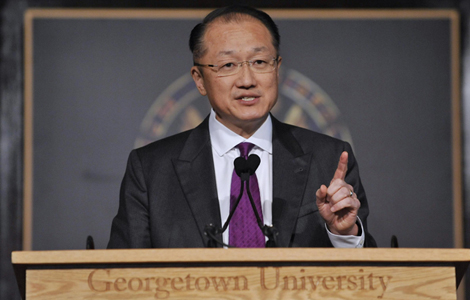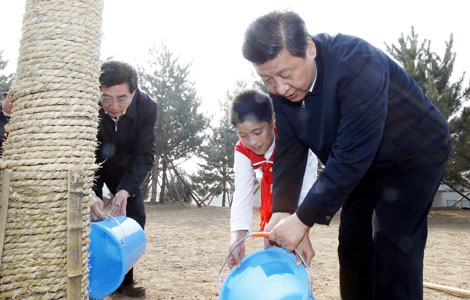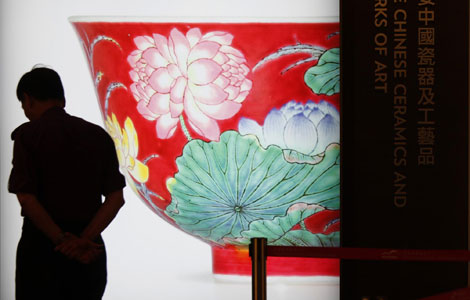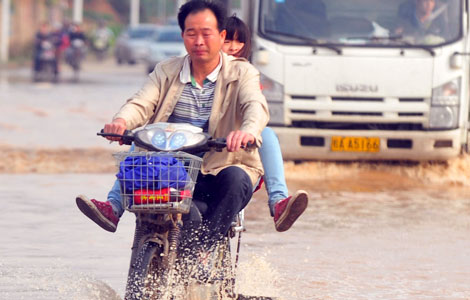Chinese partnerships helping the world
Updated: 2013-03-27 07:32
By Shan Juan (China Daily)
|
||||||||
Bill & Melinda Gates Foundation chief outlines 'win-win' model
China may not receive as many donations from the Bill & Melinda Gates Foundation as it used to, but the country's continued development as a global economic power has become a win-win situation to the foundation, and even the wider global charity landscape, according to Ray Yip, the chief representative of the organization in China.
Yip said China has now become more of a platform for the foundation's global projects, rather than a donation recipient.
"We operate here under the slogan 'in China for the world', but that used to be 'in China for China'," Yip told China Daily in an exclusive interview.
When the foundation first became involved in China in 2007, grants were paid directly to local partners, and these were aimed mainly at improving the country's response to HIV/AIDS, he explained.
Nowadays in China, "we set targets, say, for Africa and work mainly to help achieve those", he added.
For example, a recent vaccine research and development program managed in China but funded by the foundation was able to substantially reduce the price of vaccines provided by established multinational manufacturers to Africa, from $100 per dose to $6.
Similarly, in 2009 the foundation forged a partnership with the Chinese Academy of Agricultural Sciences to breed green super rice, especially for the infertile regions of Asia and Africa.
"These kinds of investments and partnerships from China have kept on increasing, and we will also continue to promote 'only for China' projects too," he said.
Yip said China has some unique advantages in providing a solid platform for the foundation's global charity efforts, including its high-tech development and manufacturing capabilities, strong support from government in funding and policies and relatively low operational costs.
Worldwide, India and Brazil have similar characteristics and equal potential for the foundation, he added.
"But strong government support is unique here in China, and that could play an even greater role for the foundation, and even the world charity sector, in the future," he added.
This partner approach is well illustrated by the foundation's work with China National Biotec Group, a subsidiary of China National Pharmaceutical Group Corp.
Li Meng, the deputy director of its international cooperation department, said both sides have benefited from this new form of partnership.
The group and the foundation signed a cooperation agreement on a polio eradication project in 2011, which aims to improve China's oral polio vaccine production capacity while at the same time helping the group meet its own targets of supplying mainly Africa with cheap and high-quality vaccines, she said.
"Through the partnership, we got a boost to funding, technology, international exposure in the industry and skills, by being able to meet global requirements and tap into the overseas market," she explained.
Cooperation between the two will continue in future, particularly for vaccines with high demand from both China and the world, said Li, adding that the collaboration is a win-win situation.
Yip pointed out that this kind of arrangement actually benefits a third party too, by providing Africa with affordable and quality vaccines.
"Our charity is a form of investing, but in our case, that's investing in poor people around the world," he said.
Wang Zhenyao, director of the China Philanthropy Research Institute at Beijing Normal University, said that the foundation's "in China for the world" model demonstrates rising global recognition of China's development influence, and said that the experience will prove valuable for the rest of the charity sector.
"It marks a significant change, and the new model could well help China further improve and standardize its relative operations - that's what China needs more of."
shanjuan@chinadaily.com.cn

 Qingming Cultural Festival opens in C China
Qingming Cultural Festival opens in C China
 World Bank seeks end to extreme poverty by 2030
World Bank seeks end to extreme poverty by 2030
 World Trade Center rises again
World Trade Center rises again
 UN General Assembly approves Arms Trade Treaty
UN General Assembly approves Arms Trade Treaty
 Xi gives green light for planting
Xi gives green light for planting
 Sotheby's to hold Spring Sale in HK
Sotheby's to hold Spring Sale in HK
 Cities urged to step up drainage improvements
Cities urged to step up drainage improvements
 Opening up on autism
Opening up on autism
Most Viewed
Editor's Picks

|

|

|

|

|

|
Today's Top News
China, US to deepen military ties
BYD to build electric bus assembly plant
Chinese becoming US citizens decline
Beijing calls for DPRK talks
Kerry reaffirms defense commitment to ROK, Japan
Caroline Kennedy may be US envoy to Japan
New Chinese Ambassador arrives in US
Apple revises warranty terms
US Weekly

|

|





